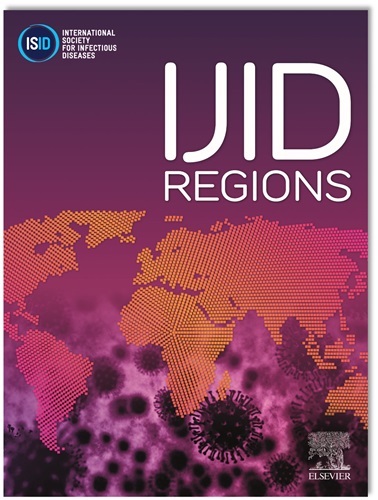Mosquitocidal efficacy and pharmacokinetics of single-dose ivermectin versus three-day dose regimen for malaria vector control compared with albendazole and no treatment: An open-label randomized controlled trial
IF 4.8
2区 医学
Q1 INFECTIOUS DISEASES
引用次数: 0
Abstract
Objectives
When malaria vectors consume ivermectin in a blood meal, their survival probability decreases, potentially reducing malaria transmission during mass drug administrations. However, questions remain regarding the optimal dosing. This study aimed to compare the mosquitocidal effect and pharmacokinetics of two-dose regimens of ivermectin for malaria vector control.
Design
We conducted an open-label randomized control trial in Kenya, staggered in blocks with sequential intervention groups and parallel controls. Participants were randomly assigned (2:1:1:1) using computer random-sequence generation, unstratified, with one block of six pharmacokinetics-only participants (single-dose ivermectin) and six blocks of four participants (3:1 intervention vs control), to receive single-dose ivermectin (400 mcg/kg, n = 12), three daily doses (3-day regimen 300 mcg/kg, n = 6), albendazole (400 mg, n = 6), or no treatment (negative control, n = 6). Our primary outcome was Anopheles gambiae survival (time-to-event [days]) after blood feeding up to 10 days after drug administration. We also evaluated pharmacokinetics (peak plasma and capillary blood concentration, areas under the plasma and capillary blood concentration-time curve from time of last administration to time of last observation, time to reach peak plasma and capillary blood concentration, terminal elimination half-life) up to 7 days after treatment.
Results
A total of 36 healthy volunteers aged 21-32 years were recruited into the study and followed up to completion, with two participants not attending the visit on day 28. All drug regimens were well-tolerated. Both regimens showed significant mosquitocidal effect in the first 7 days. At 10 days after treatment, the single dose presented superior longevity of effect (adjusted hazard ratio = 3.91; 95% confidence interval = 1.93-7.93; P <0.001) compared with the triple dose (adjusted hazard ratio = 1.79; 95% confidence interval = 0.88-3.62; P = 0.0.11). Albendazole had, overall, no mosquitocidal effect.
Conclusions
It is unclear why a single dose led to increased bio-efficacy compared with a triple dose. We recommend trials investigating ivermectin mass drug administrations for malaria control to consider single-dose ivermectin. A single-dose regimen is also expected to present additional operational advantages compared with a 3-day regimen, leading to improved programmatic suitability.
与阿苯达唑和不治疗相比,单剂量伊维菌素与三日剂量方案对疟疾病媒控制的杀蚊效果和药代动力学:一项开放标签随机对照试验。
目的:当疟疾病媒在血餐中摄入伊维菌素时,其存活概率会降低,从而有可能在大规模用药期间减少疟疾传播。然而,关于最佳剂量的问题依然存在。本研究旨在比较伊维菌素用于疟疾病媒控制的两种剂量方案的杀蚊效果和药代动力学:设计:我们在肯尼亚进行了一项开放标签随机对照试验,该试验分块进行,干预组和对照组依次交错。试验采用计算机随机序列生成技术对参与者进行随机分配(2:1:1:1),不分层,其中一个区组只有六名药物动力学参与者(单剂量伊维菌素),六个区组各有四名参与者(干预组与对照组的比例为 3:1),分别接受单剂量伊维菌素(400 毫克/千克,n=12)、每日三剂量(三日疗法 300 毫克/千克,n=6)、阿苯达唑(400 毫克,n=6)或不治疗(阴性对照,n=6)。我们的主要研究结果是给药后 10 天内冈比亚按蚊采血后的存活率(事件发生时间(天数))。我们还评估了治疗后 7 天内的药代动力学(Cmax、AUC、Tmax、Thalf):研究共招募了 36 名 21-32 岁的健康志愿者,并对他们进行了随访,其中有 2 人在第 28 天未参加随访。所有药物治疗方案的耐受性均良好。两种方案在头 7 天均显示出明显的杀蚊效果。在治疗后 10 天,单一剂量的疗效更持久(aHR(调整后危险比)=3.91;95% CI=1.93-7.93;p 结论:目前还不清楚为什么单剂量比三剂量的生物有效性更高。我们建议研究伊维菌素 MDA 控制疟疾的试验考虑单剂量伊维菌素。与三日疗法相比,单剂量疗法预计还会带来更多的操作优势,从而提高计划的适用性。
本文章由计算机程序翻译,如有差异,请以英文原文为准。
求助全文
约1分钟内获得全文
求助全文
来源期刊
CiteScore
18.90
自引率
2.40%
发文量
1020
审稿时长
30 days
期刊介绍:
International Journal of Infectious Diseases (IJID)
Publisher: International Society for Infectious Diseases
Publication Frequency: Monthly
Type: Peer-reviewed, Open Access
Scope:
Publishes original clinical and laboratory-based research.
Reports clinical trials, reviews, and some case reports.
Focuses on epidemiology, clinical diagnosis, treatment, and control of infectious diseases.
Emphasizes diseases common in under-resourced countries.

 求助内容:
求助内容: 应助结果提醒方式:
应助结果提醒方式:


